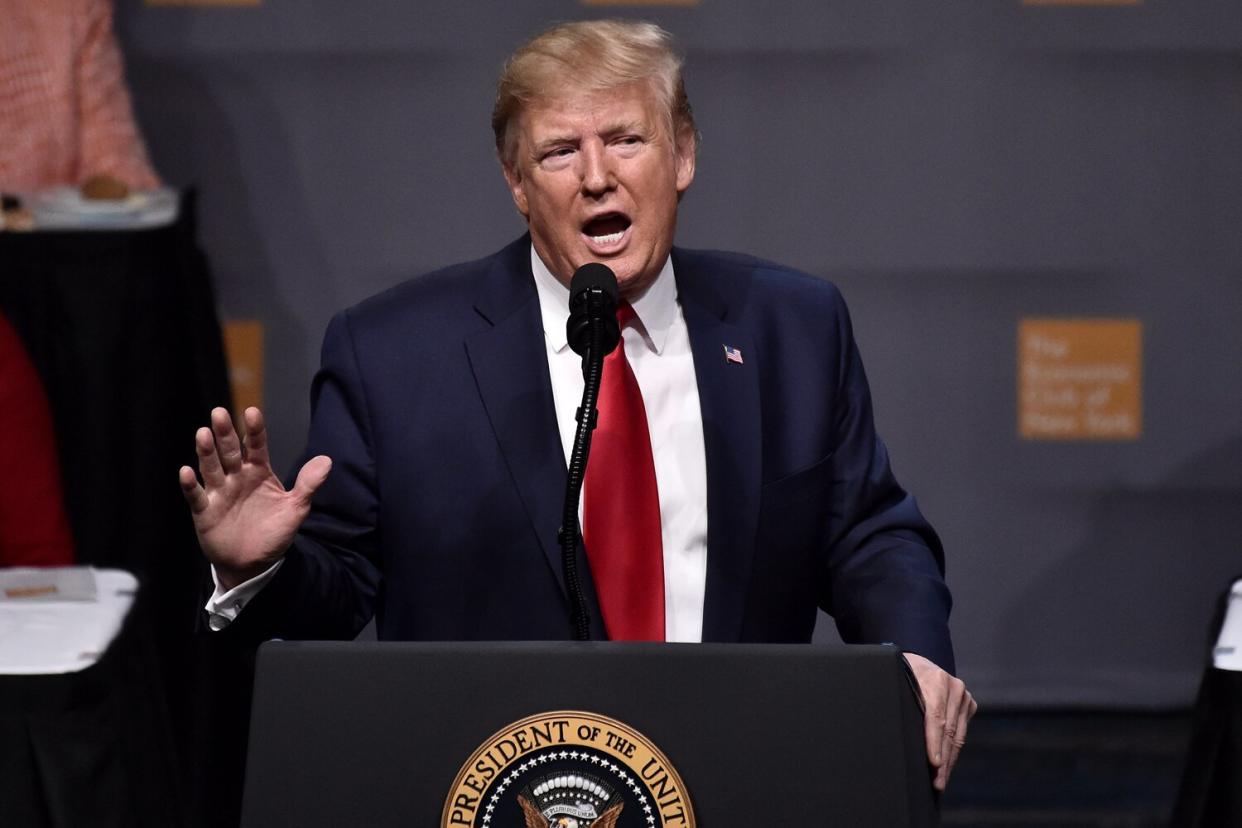New Book Appears to Solve Trump's 2019 Medical Mystery Over Sudden Hospital Visit

Steven Ferdman/WireImage Donald Trump
Former White House Press Secretary Stephanie Grisham seems to have finally, publicly unraveled the mystery surrounding a secretive trip then-President Donald Trump took to Walter Reed National Military Medical Center in November 2019.
While theories and rumors abounded over the sudden hospital visit — suggesting that Trump, now 75, had suffered a stroke or another serious medical complication — Grisham, 45, suggests the true reason for the visit was far more pedestrian: a colonoscopy.
In her new memoir, I'll Take Your Questions Now, Grisham implies that Trump's visit to Walter Reed was for a routine colonoscopy as part of his annual physical. But it wasn't made public because Trump was worried of being made fun of by late-night talk show hosts.
What's more, Grisham writes, he didn't want to cede any authority, even temporarily, to Vice President Mike Pence.
"I thought the American people had a right to know about the health of the president, and I still do. But I didn't push the matter too hard," Grisham writes in her book. "I think the president was embarrassed by the procedure, even though President George W. Bush had had the same one done when he was in office and had been very transparent about it."
Politico reports that multiple former officials confirmed a colonoscopy was indeed the reason for Trump's unannounced visit to the medical center, which had piqued the curiosity of the political press at the time.
Tthe secrecy surrounding the trip fueled coverage of it, with CNN reporting it "did not follow the protocol of a routine ... exam" and ABC News noting the trip had not previously been on the president's public schedule.
At the time, the White House said Trump was at Walter Reed only for "a quick exam and labs" in order to get started on his annual physical, with Grisham herself dismissing what she called "conspiracy theories" about the hospital trip.
RELATED VIDEO: What Melania Trump's Biographers Learned — 'More in It for Her to Stay Than to Go'
A year later, however, New York Times reporter Michael Schmidt's book Donald Trump v. The United States reported that Trump's visit to Walter Reed came with serious implications: "In the hours leading up to Trump's trip to the hospital, word went out in the West Wing for the vice president to be on standby to take over the powers of the presidency temporarily if Trump had to undergo a procedure that would have required him to be anesthetized."
As Grisham writes in her book now, Trump opted not to go under anesthesia for the procedure, because he did not want Pence to take over the country, if only briefly.
The president's doctor said in 2019 that he didn't have "any specialized cardiac or neurological evaluations," in response to rumors that Trump had suffered from strokes.
RELATED: Ivanka Trump and Jared Kushner Were Dubbed the 'Interns' by White House Critics, Melania's Aide Says
Trump himself shot back at such claims during his 2020 run for reelection.
"It never ends! Now they are trying to say that your favorite President, me, went to Walter Reed Medical Center, having suffered a series of mini-strokes," he tweeted in 2020, before his account was permanently suspended after the Capitol riots. "Never happened to THIS candidate - FAKE NEWS."

Alex Wong/Getty Images Stephanie Grisham
Despite statements from the former president, first lady and others in Trump's orbit calling much of I'll Take Your Questions Now untrue — with Melania Trump slamming her use of "mistruth and betrayal" — Grisham stands by her accounts of what unfolded
"I'm not going to go tit-for-tat with everything that people are going to say I misremembered or was wrong about," Grisham, who has now acknowledged lying in her job, told PEOPLE in an interview this week.
"I write in the beginning of the book that these are my memories to the best of my recollection," Grisham said. "It's because I never planned to write a book, I don't have notes and journals and wasn't being sneaky. But I think, which I've said all along, is that they don't like this message so they're trying to discredit the messenger."
"This book is for the public to read," she continued, "and they can believe, look and decide for themselves if I've been honest."

